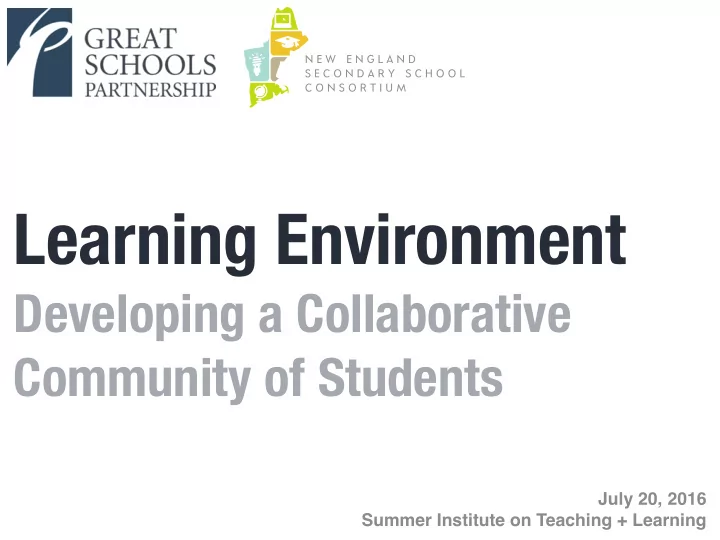

Learning Environment Developing a Collaborative Community of Students July 20, 2016 Summer Institute on Teaching + Learning
TODAY’S PRESENTERS From the Great Schools Partnership Andi Summers, Senior Associate Jean Haeger, Senior Associate
Agenda Opening Activity - “Scattergories” What do we mean by learning environment? Stations: Tomlinson quotes, partner brainstorm, group video discussion Chalk Talk Reflection Questions?
“Scattergories” Directions Form partners / triads Write down the following categories: • A school subject or activity • Great teaching is . • A math word • An instructional strategy • A city You and your partner(s) will have 2 minutes to come up with a word or phrase that fits each category, all beginning with the letter we roll. • You must choose only 1 word/phrase per category. • You will get a point for each unique word/phrase. • You can be creative or humorous in your interpretation, but the room gets to vote on if it is acceptable!
Outcomes Understanding the kinds of physical structures, routines and expectations that support classrooms with varied groups and activities happening at once
Outcomes Increased knowledge of deliberate strategies for building positive relationships between teachers and students and between classmates
Outcomes Creation of a list of ways to rethink a lesson or unit you’ve taught that could potentially increase engagement, differentiation, and enjoyment
What do we mean by Learning Environment? Physical space Routines and procedures Classroom management Safe and supportive environment for taking risks, asking questions, and making mistakes
Physical Space
Routines and Procedures Effective teachers use routines for daily tasks more than their ineffective counterparts. They invest the time at the start of the school year to teach the routines. -Stronge, Tucker, & Ward, 2003
Stations or Centers
Classroom Management Comparing the effectiveness of aspects of Decrease in Number of Average Number classroom management number of students effect-size of studies disruptions or pupils Summary of experimental data from Marzano (2003) (Average for the studies) Rules and procedures Strategies to clearly and simply express rules and other expectations of student behaviour. Also to 0.76 626 10 28% justify these persuasively from the teacher’s and students’ point of view. For greatest effect the rules are negotiated with students Teacher-student relationships Strategies to improve the rapport, and mutual 0.87 1110 4 31% respect between teacher and student Disciplinary interventions The effective use of ‘sticks and carrots’ to enforce 0.91 3322 68 32% the rules described above Mental set Strategies to develop your awareness of what is going on in your classroom and why. A conscious 1.3 502 5 40% control over your thoughts and feelings when you respond to a disruption. table from Evidence Based Teaching by Geoff Petty (2006)
Safe + Supportive Environment Trust between teacher/student and student/student Model risk-taking Varying questioning techniques Develop a culture that celebrates being wrong
Safe + Supportive Environment Deliberate team building Projects requiring collaboration (skills individually assessed) High interest, engaging learning activities Reflection
3 Rotating Centers 15 minutes each 1. Tomlinson quotes 2. Partner brainstorm 3. Video about collaborative work contracts
Resources New Tech Network Collaborative Work Group Contracts Collaborative Routines – Tools for Classroom Teachers Five Movement Strategies in the High School Classroom Learning Centers in the Secondary Classroom Chalk Talk Protocol
Questions?
482 Congress Street, Suite 500 Portland, ME 04101 207.773.0505 greatschoolspartnership.org THANK YOU Andi Summers Senior Associate asummers@greatschoolspartnership.org Jean Haeger Senior Associate jhaeger@greatschoolspartnership.org
Recommend
More recommend